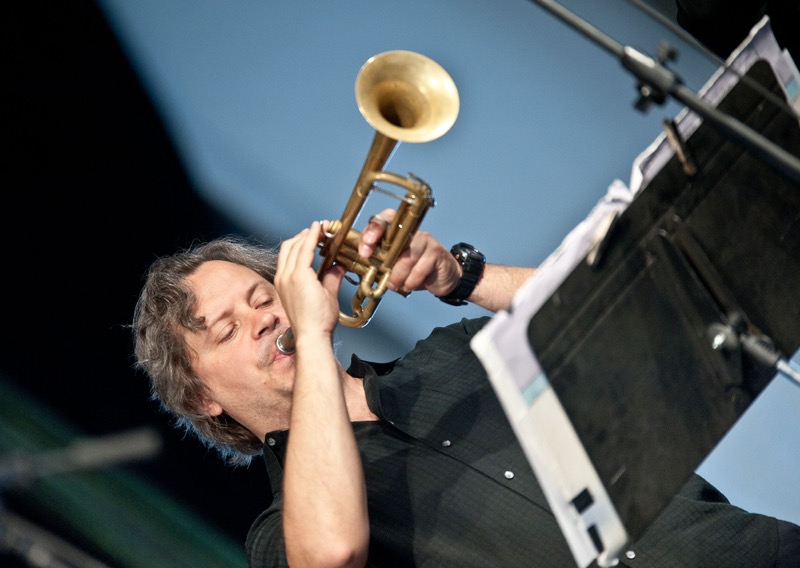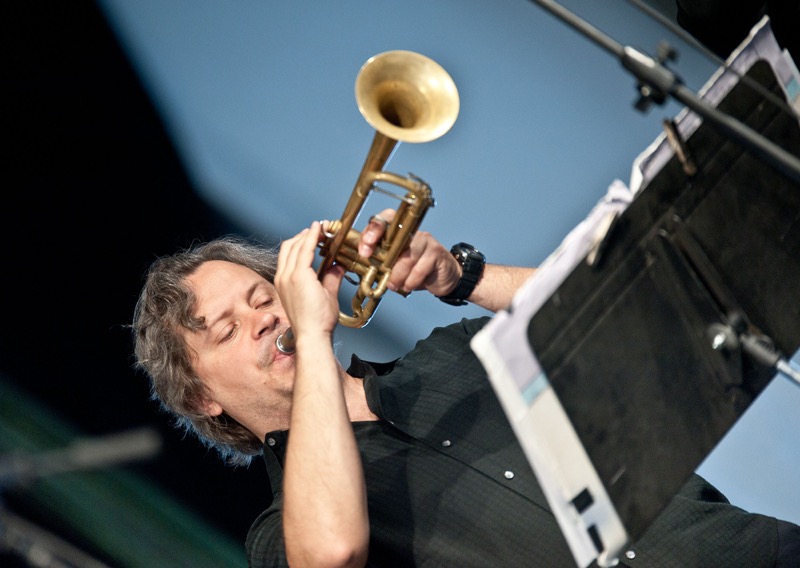
[caption id="attachment_42952" align="alignnone" width="800"] Alex Sipiagin. [/caption]
Alex Sipiagin. [/caption]
By Tim Sommer
Mesmerizing in its’ complexity and enchanting in its’ beauty, jazz is a wildly diverse dictionary of feelings, influences, and styles, written in a language that can be understood on all the corners of the earth.
One of jazz’s masters, horn player Alex Sipiagin, will be performing at the Parrish Art Museum on Friday, August 28. Sipiagin was born deep in northeast Russia. He moved to New York City in 1991, and now lives in the East End.
“I spent my first 10 years in the United States in Manhattan, noisy Manhattan,” Mr. Sipiagin, a handsome man in his late 40s, remembers. “The city was very inspiring, I was playing gigs almost every night, and enjoying all this energy and noise. But at some point I felt like this extra stuff in the city was sucking my energy. A friend of mine, a great musician named Gil Goldstein, lived in the North Fork. I visited him a few times and I fell in love with the area. It’s so quiet and so peaceful and so good for your soul.”
In addition to being a flugelhorn player and trumpeter of extraordinary, almost acrobatic skill and rich, expressive depth, Mr. Sipiagin is also a composer, arranger, producer, and teacher. He has also collaborated with many of the top names in every form of jazz, from Michael Brecker to the Mingus Dynasty, and he has thrown his exotic and elegiac lightning on pop records by Elvis Costello and Eric Clapton, amongst many others.
Deliciously intricate without being overwhelming, Mr. Sipiagin’s music skips stones over a lake full of history and emotions, with a persuasive (yet never rushed) quality, conjuring the image of a fast doe running through the city. Startling in its’ accomplishment and athleticism but always warm, Sipiagin’s post-bop compositions draw from varied influences.
“The music comes from many different places,” Mr. Sipiagin explains. “I studied classical music in a Russian conservatory, then I fell in love with jazz and came to New York, it was my dream. Of course when I compose my music there’s an immense influence of Russian literature and nostalgia, at the same time there’s the energy of New York, and modern art. For me, my music combines all my favorite places, all my favorite moments of my life.”
Amidst the tsunami of skill and style, there’s something Mr. Sipiagin never loses site of:
“Basically, the number one base of my music is the melody. First of all I’m trying to sing the melody. The next step when I compose is to create a background that adds some complexity, though I find the more you listen to this music, actually its sounds less complicated. That’s what everyone says.”
Although he hasn’t lived in Russia for nearly a quarter of a century, his homeland is still alive in Mr. Sipiagin’s music.
“Absolutely,” he confirms. “I have a lot of compositions that are based on traditional Russian folk songs which come from the 17th and 18th century, some of which you can only find in villages in Siberia. I have researched a lot of Russian music, and a lot of Russian classical music -- Rachmaninoff or Scriabin are my most favorite composers, and of course Stravinsky. When you take the Second Concerto by Rachmaninoff, each bar is so full of beauty. The Second inspired me a lot, a lot of my melodies come from there spiritually. I didn’t copy from it, but it inspired me. Believe it or not, all those heavy guys, like Duke Ellington or Mingus, were inspired by classical composers like Stravinsky and, again, Rachmaninoff.”
The Soviet Union fell when Mr. Sipiagin was in his mid-20s. Prior to then, was it hard to find jazz in the old Soviet Union?
“It was extremely difficult,” Mr. Sipiagin notes, “but that’s one of the things that created such an interest in this music! Sometimes we would record off the radio, sometimes from Voice of America, sometimes we would get a few tapes – it was very difficult to get this material, but these difficulties would create a real interest. I would be anxious to find some Miles Davis recordings, or some Coltrane, and once I found it, I would try to learn it upside down, I would try to analyze it, I didn’t want to miss anything. That’s what led me to the United States,” Sipiagin continues, “I was studying the music, then playing in competitions, and then realizing that because of the competitions I was participating in I could end up staying here. Yes, it was difficult, but it was very exciting, and it’s still exciting.”
What is it like playing back in Russia?
“In the last 10 years I’ve been going to Russia maybe twice a year. Russia is a very stubborn country, you really need to prove yourself,” Mr. Sipiagin laughs. “Finally they started to recognize my music and start inviting me to jazz festivals. Russian people really love jazz. They treat jazz like a classical music. You play concerts in big symphonic halls, and they listen with a really high level of concentration. It’s different from America.”
Although he clearly loves his adopted country, Mr. Sipiagin remains slightly disappointed in the way jazz is perceived in the United States.
Everyone respects American jazz more than American people, for some reason,” Sipiagin says. “I don’t know why. When you perform, for example, at the Hollywood Bowl Jazz Festival in Los Angeles, people are having fun, they’re having a party, they’re having picnics, and maybe like 30 percent of them really pay attention to what’s happening on the stage. But when you’re playing in Europe, or Russia, Asia, Japan, China, you see all the faces with the open mouths, they totally listen, and it’s quiet. They treat American music much better than in America.”
The Alex Sipiagin Quartet appears at the Parrish Art Museum on
Friday, August 28, from 6:00pm to 8:00pm. Free with Museum admission.
279 Montauk Highway, Water Mill. For more info (631) 283-2118, or visit parrishart.org.